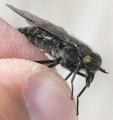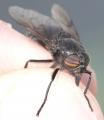Diptera.info :: Identification queries :: Diptera (adults)
Who is here? 1 guest(s)
|
What therevid?
|
|
| Rui Andrade |
Posted on 07-11-2007 19:21
|
|
Member Location: Portugal Posts: 3123 Joined: 19.06.07 |
Is it possible to find out what this species is (or at least the genus)? Thanks location: Portalegre, Portugal date: 2007/09/05  |
| Paul Beuk |
Posted on 07-11-2007 19:46
|
|
Super Administrator Location: Netherlands Posts: 19403 Joined: 11.05.04 |
I'd go for Thereva.
Paul - - - - Paul Beuk on https://diptera.info |
| Zeegers |
Posted on 07-11-2007 20:52
|
|
Member Location: Soest, NL Posts: 18976 Joined: 21.07.04 |
Right. And if you take a good look, you'll notice the calli are not connected. So it must be something like the female of T. bipunctata, which occurs in sandy habitats, as suggested by the pic. Theo |
|
|
|
| Rui Andrade |
Posted on 07-11-2007 22:09
|
|
Member Location: Portugal Posts: 3123 Joined: 19.06.07 |
It's not really sand, it's dry soil. Portalegre is in the interior South of Portugal and its climate is dry and hot, with dry grass and some trees like Quercus suber and Olea europaea. With this habitat, is it possible to be T. bipunctata? Zeegers wrote: And if you take a good look, you'll notice the calli are not connected. Could you tell me where is the callus exactly? I'm under the impression that there are many places called callus... |
| crex |
Posted on 07-11-2007 23:17
|
|
Member Location: Sweden Posts: 1996 Joined: 22.05.06 |
Callus![header=[Callus] body=[The Glossary contains no matching items.<br />It may have been added using different lettering,<br />so you can click the Term to check this.<br />Otherwise, contact the Administrator to report this error.<br /><img src='../infusions//terms/images/no_image.gif' style='vertical-align:middle;' />] delay=[0] fade=[on]](../infusions/terms/images/help.gif) |
|
|
|
| Rui Andrade |
Posted on 07-11-2007 23:41
|
|
Member Location: Portugal Posts: 3123 Joined: 19.06.07 |
Thank you crex. I had already seen the glossary but in the net I read other terms like humeral callus and this had me confused. |
| Zeegers |
Posted on 08-11-2007 09:19
|
|
Member Location: Soest, NL Posts: 18976 Joined: 21.07.04 |
I used 'sandy' in order to prevent the word 'arid'. But now that you ask, 'arid' would be better. The picture shows to me a good bipunctata-habitat, as far as one can tell from such a small area. Theo |
|
|
|
| jorgemotalmeida |
Posted on 08-11-2007 12:02
|
|
Member Location: Viseu - PORTUGAL Posts: 9296 Joined: 05.06.06 |
callus - you can see two black spots above the antennae, and before the ocelli.  in the other meaning - callus can be the "shoulder" on the thorax. 
Edited by jorgemotalmeida on 08-11-2007 12:40 |
| ChrisR |
Posted on 08-11-2007 12:34
|
|
Super Administrator Location: Reading, England Posts: 7703 Joined: 12.07.04 |
Well, I'd say the humeral callus on a tachinid is more like the 'shoulders'.  I have been toying with the idea of anthropomorphising some of the glossary in the UK key a little - to help people locate the body parts. Scientific words are very precise if you are familiar with them but I think for novices to say (in the glossary only) humeral callus (=shoulders) or parafacial area (=cheeks) or parafrontal/frons (=forehead) might be more friendly. It's more difficult to make similes with places like the subscutellum though 
Edited by ChrisR on 08-11-2007 12:35 |
| jorgemotalmeida |
Posted on 08-11-2007 12:39
|
|
Member Location: Viseu - PORTUGAL Posts: 9296 Joined: 05.06.06 |
Chris Raper wrote: Well, I'd say the humeral callus on a tachinid is more like the 'shoulders'.  I have been toying with the idea of anthropomorphising some of the glossary in the UK key a little - to help people locate the body parts. Scientific words are very precise if you are familiar with them but I think for novices to say (in the glossary only) humeral callus (=shoulders) or parafacial area (=cheeks) or parafrontal/frons (=forehead) might be more friendly. It's more difficult to make similes with places like the subscutellum though  YES! you have reason, Chris. I was thinking *REALLY* on SHOULDERS, but wrote the wrong word! Thanks for appointing the error! I fixed my mistake.  antennae --> nose?  LOL LOL |
| Paul Beuk |
Posted on 08-11-2007 12:42
|
|
Super Administrator Location: Netherlands Posts: 19403 Joined: 11.05.04 |
Chris Raper wrote:I have been toying with the idea of anthropomorphising some of the glossary in the UK key a little - to help people locate the body parts. Scientific words are very precise if you are familiar with them but I think for novices to say (in the glossary only) humeral callus (=shoulders) or parafacial area (=cheeks) or parafrontal/frons (=forehead) might be more friendly. It's more difficult to make similes with places like the subscutellum though Where would that leave the genae?
 Paul - - - - Paul Beuk on https://diptera.info |
| jorgemotalmeida |
Posted on 08-11-2007 12:49
|
|
Member Location: Viseu - PORTUGAL Posts: 9296 Joined: 05.06.06 |
parafacial + genae = cheeks  proboscis = a big tongue with a sucking structure.  |
| Rui Andrade |
Posted on 08-11-2007 20:35
|
|
Member Location: Portugal Posts: 3123 Joined: 19.06.07 |
Thank you all for your valueble help . .Jorge: your explanation for the meaning of callus was excelent (very simple), thank you  . . |
| Jump to Forum: |













